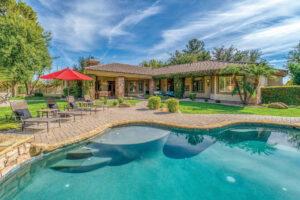 Installing a swimming pool is a big investment that requires careful thought and planning. It is essential to evaluate different options, prepare your property, and understand the maintenance involved. Knowing these factors ahead of time will help ensure a smooth installation process and long-term enjoyment! Let us dive in!
Installing a swimming pool is a big investment that requires careful thought and planning. It is essential to evaluate different options, prepare your property, and understand the maintenance involved. Knowing these factors ahead of time will help ensure a smooth installation process and long-term enjoyment! Let us dive in!
Choosing the Right Pool
 Before installing a pool, we suggest you research the different types available. The most common options are in-ground, above-ground, and semi-inground pools. In-ground pools can be made from concrete, fiberglass, or vinyl liner, each with its own pros and cons. Concrete pools are durable and customizable but require more maintenance and take longer to install. Fiberglass pools are low-maintenance and quick to set up, but they have limited design flexibility. Vinyl liner pools are usually more affordable but need liner replacements over time. Above-ground pools are less permanent than in-ground or the combination of the two, semi-inground pools. There are also several materials to choose from for an above-ground pool, including resin, steel, and aluminum. In addition, you should consider the pool’s shape, size, and depth. If you have kids, a shallower and safer design might be a better fit. Additional features like lighting, heating, waterfalls, and covers can also enhance your pool’s appearance and functionality.
Before installing a pool, we suggest you research the different types available. The most common options are in-ground, above-ground, and semi-inground pools. In-ground pools can be made from concrete, fiberglass, or vinyl liner, each with its own pros and cons. Concrete pools are durable and customizable but require more maintenance and take longer to install. Fiberglass pools are low-maintenance and quick to set up, but they have limited design flexibility. Vinyl liner pools are usually more affordable but need liner replacements over time. Above-ground pools are less permanent than in-ground or the combination of the two, semi-inground pools. There are also several materials to choose from for an above-ground pool, including resin, steel, and aluminum. In addition, you should consider the pool’s shape, size, and depth. If you have kids, a shallower and safer design might be a better fit. Additional features like lighting, heating, waterfalls, and covers can also enhance your pool’s appearance and functionality.
Preparing for Installation
 Once you have chosen the right pool, proper preparation is key. First, check local zoning laws and homeowner association rules to make sure your pool meets all the regulations. You may need permits, and there could be restrictions on placement, fencing, and safety measures. The last thing anyone needs is to have the pool installed and then find out it is a problem afterward! Next, evaluate the site. The area should have good soil conditions, drainage, and accessibility for construction equipment. Sometimes, excavation reveals unexpected issues, such as rocky terrain or a high-water table, which could increase costs. Budgeting is also important. You will need to consider ongoing maintenance, water and energy costs, and potential repairs. With this, we suggest you receive quotes from multiple contractors and make sure all expenses, including excavation, materials, and labor, are clearly outlined.
Once you have chosen the right pool, proper preparation is key. First, check local zoning laws and homeowner association rules to make sure your pool meets all the regulations. You may need permits, and there could be restrictions on placement, fencing, and safety measures. The last thing anyone needs is to have the pool installed and then find out it is a problem afterward! Next, evaluate the site. The area should have good soil conditions, drainage, and accessibility for construction equipment. Sometimes, excavation reveals unexpected issues, such as rocky terrain or a high-water table, which could increase costs. Budgeting is also important. You will need to consider ongoing maintenance, water and energy costs, and potential repairs. With this, we suggest you receive quotes from multiple contractors and make sure all expenses, including excavation, materials, and labor, are clearly outlined.
Maintaining Your Pool
 Now for the real hard work! Owning a pool means committing to regular upkeep. One of the most important tasks is managing water quality. You will need to regularly test and balance pH, chlorine levels, alkalinity, and calcium hardness. If it is not properly maintained, your pool can develop algae, bacteria, or cloudy water, which can be unsafe for swimmers. This also ties into cleaning. Skimming debris, vacuuming the pool floor, and brushing the walls prevent buildup and keep the water clear. You also need to maintain the filtration system by cleaning or replacing filters and ensuring the pumps and skimmers are working properly! Seasonal maintenance varies depending on your climate. In warmer climates, continuous care is required to prevent evaporation, algae growth, and filter clogging.
Now for the real hard work! Owning a pool means committing to regular upkeep. One of the most important tasks is managing water quality. You will need to regularly test and balance pH, chlorine levels, alkalinity, and calcium hardness. If it is not properly maintained, your pool can develop algae, bacteria, or cloudy water, which can be unsafe for swimmers. This also ties into cleaning. Skimming debris, vacuuming the pool floor, and brushing the walls prevent buildup and keep the water clear. You also need to maintain the filtration system by cleaning or replacing filters and ensuring the pumps and skimmers are working properly! Seasonal maintenance varies depending on your climate. In warmer climates, continuous care is required to prevent evaporation, algae growth, and filter clogging.
Enjoying Your Pool
 A pool can be one of the most rewarding items you own. Not only does it provide personal joy and exercise, but it also can make you the talk of the neighborhood. By choosing the right pool, preparing your property properly, and staying on top of maintenance, you can enjoy your investment for years to come. Thoughtful preparation and responsible care will help keep your pool safe, functional, and enjoyable. Do not be daunted by maintenance, upkeep, heating/cooling systems or chemicals. There is an abundant number of professionals in our area that will keep your pool in excellent shape at a nominal charge, and all you have to do is sit back and enjoy!
A pool can be one of the most rewarding items you own. Not only does it provide personal joy and exercise, but it also can make you the talk of the neighborhood. By choosing the right pool, preparing your property properly, and staying on top of maintenance, you can enjoy your investment for years to come. Thoughtful preparation and responsible care will help keep your pool safe, functional, and enjoyable. Do not be daunted by maintenance, upkeep, heating/cooling systems or chemicals. There is an abundant number of professionals in our area that will keep your pool in excellent shape at a nominal charge, and all you have to do is sit back and enjoy! ![]()
Anaya Aristhomene
Home & Yard Magazine




